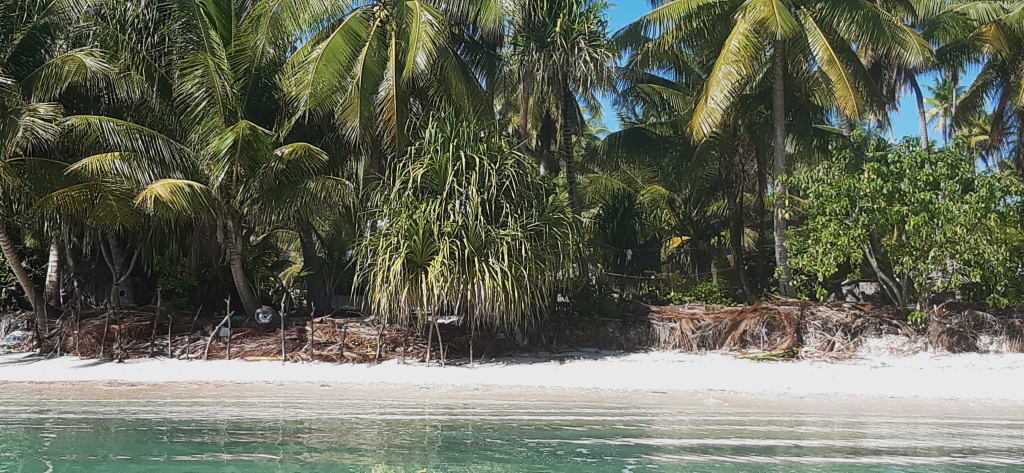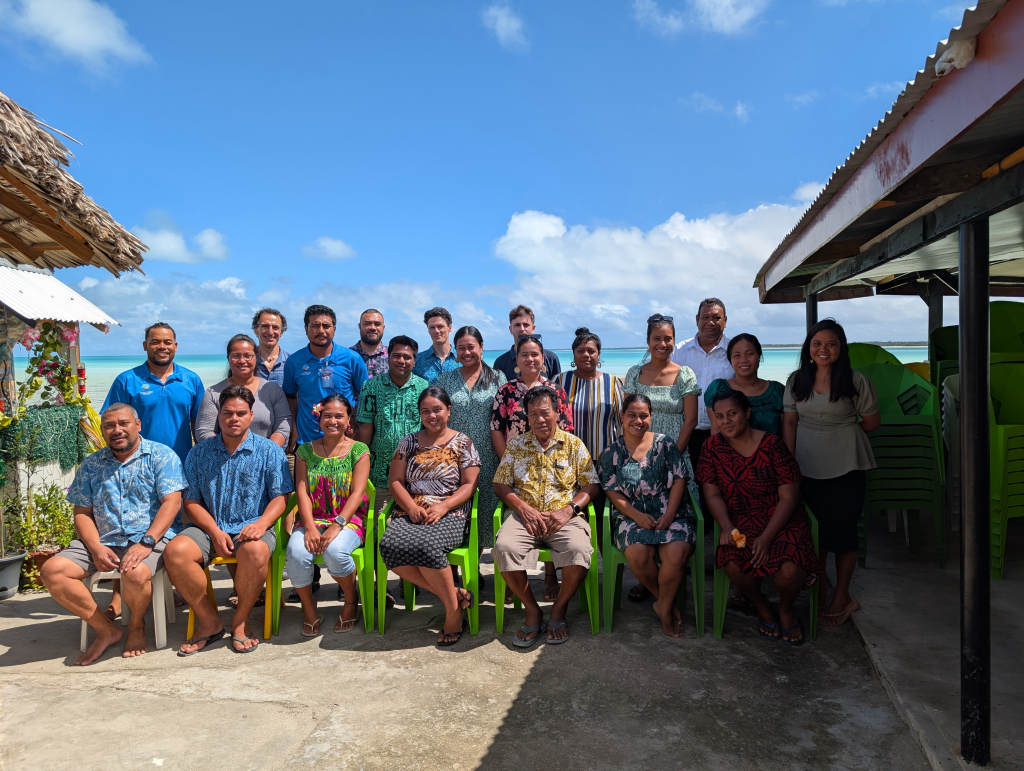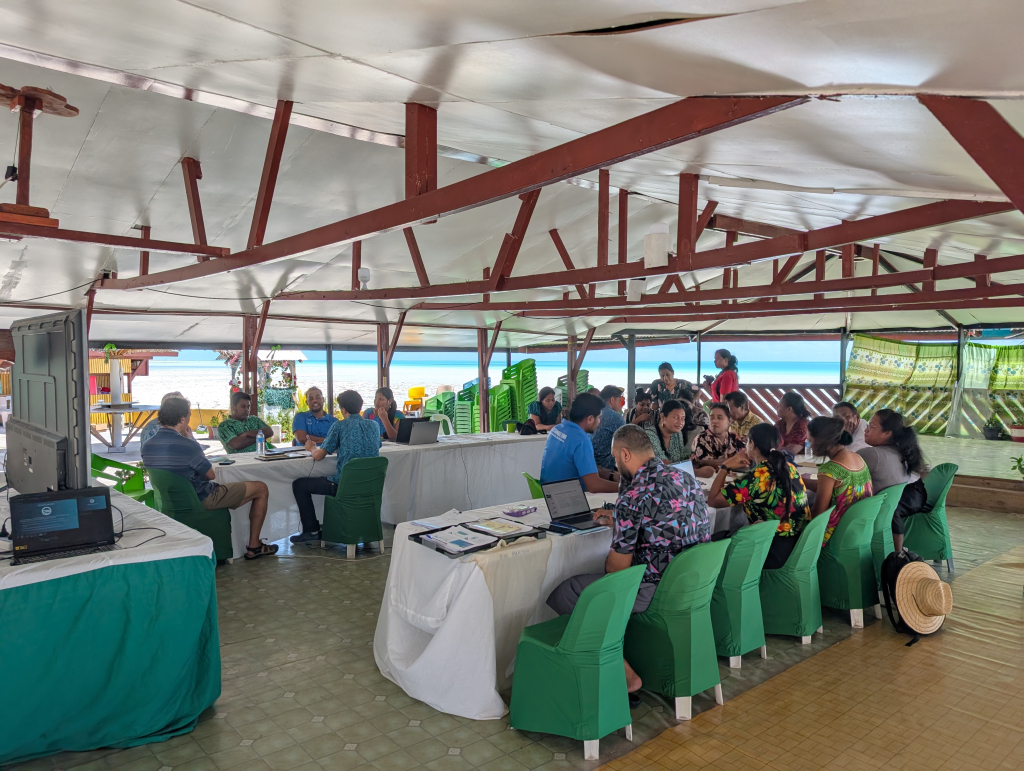
20 May 2025, Tarawa, Kiribati - The Secretariat of the Pacific Environment Programme (SPREP) through its technical assistance programme under the Kiwa Initiative, continues to support the Government of Kiribati in mainstreaming and implementing Nature-based Solutions (NbS) for Climate Change Adaptation.
The first mission to Kiribati in September 2024 with a team from O2 Metocean Pty Ltd included site visits, a national workshop and training on gender-responsive and socially inclusive NbS for climate adaptation with the Environment and Conservation Division (ECD) from the Ministry of Environment, Lands and Agricultural Development (MELAD).
As an atoll nation facing critical challenges related to coastal development and erosion accelerated by climate change, coastal NbS are specifically considered, building on lessons learnt from previous coastal ecosystem-based measures implemented in Kiribati.
The pre-feasibility study carried out in 2024, included identification of priority areas for NbS implementation, site-visits to evaluate feasibility of implementation in priority areas, shoreline evolution assessment, coastal habitat assessment, development of summary maps and recommendations for future implementation.
A second mission took place from 12 - 16 May 2025 which focused on additional community consultations as well as a national workshop to present the main findings of the pre-feasibility study and seek feedback and further suggestions from MELAD, partners and stakeholders. The consultation with the North Tarawa Council was conducted to inform council members -who represent all villages and islets across North Tarawa - about the technical assistance provided to MELAD and to share key findings from the 2024 feasibility study.
A specific coastal NbS which SPREP and O2MetOcean are specifically looking at for further recommendations is the beach brush barrier, also known as buibui in local language. Using local materials such as poles and coconut fronds, the buibui had been trialled as an Ecosystem-based Adaptation (EbA) strategy in North Tarawa and Abaiang in 2014 and 2015 through a partnership between SPREP, Dr. Joanna Ellison from University of Tasmania, and the ECD/MELAD Kiribati. These trials led to the development of a practical “Coastal Ecosystem-based Rehabilitation Guide” for communities to use as an adaptation to beach erosion problems.
The brush barrier primarily aims to mitigate coastal erosion due to wave energy and to help restore balance in sedimentation processes, offering an alternative option to seawalls in protecting houses, roads, schools and other assets located near the shoreline. This low-cost structure also provides other benefits associated with a healthy beach ecosystem, such as trapping sand and filtrating water, providing habitats for many seabird species and nesting areas for sea turtles. Beaches have important values for local communities, such as for net fishing and low tide gathering, as well as commercial values and opportunities associated with tourism.
Council members from North Tarawa shared their views, expectations and expressed their continued interest and support in the implementation and maintenance of brush barriers if a new project was to be developed. This interest was also perceived through a buibui that MELAD and the Nooto village implemented in 2024 through the Kiribati Ridge-to-Reef project.

A brush barrier (buibui) constructed in 2024 at Nooto village, North Tarawa, Kiribati (Photo: Nicolas Rocle, 2025, SPREP)
A new design for buibui was proposed to strengthen their resistance and resilience to high tides and storm surges. The council members stressed the need for support, guidelines and training on the new buibui construction, including incentives for villages to support long-term maintenance of buibui structures, acknowledging that sustainability efforts are community driven. The Vice Mayor of North Tarawa expressed her appreciation on behalf of the island for the team's consultation, emphasizing the importance of community collaboration with MELAD on NbS projects.
Key outcomes of this consultation were shared during the national NbS consultation workshop organised on 14 May 2025 in South Tarawa. The workshop brought together 25 participants from ECD/MELAD, Ministry for Fisheries and Ocean Resources (MFOR), Ministry for Women, Youth, Sport and Social Affairs (MWYSSA), Ministry of Infrastructure and Sustainable Energy (MISE), as well as several environment and youth NGOs.
Mr. Laitele Peletele, Officer in charge of the ECD Division, opened the workshop by “acknowledging the continued support of SPREP through the Kiwa Initiative and the O2MetOcean team in supporting MELAD in its NbS policy and strategies.” Key findings from the pre-feasibility study were presented and discussed through many group exercises to get participants’ feedback and inputs.
National NbS workshop with MELAD and representatives from other ministries and NGOs in South Tarawa, Kiribati, 14 May 2025 (Photo: James Owen-Conway, O2MetOcean, 2025)
A training session on NbS policy was facilitated through a group exercise and policy gap analysis, using the Kiribati Integrated Environment Policy (KIEP) and current NBSAP (National Biodiversity Strategy and Action Plan) as supporting documents. Nicolas Rocle from SPREP emphasised that this training exercise was timely given as Kiribati will undertake a review and update of the current NBSAP and National Adaptation Plan (NAP) noting that this process will ensure NbS are incorporated into these key national strategic plans.

Group exercises during the national NbS workshop in South Tarawa, Kiribati (Photo: James Owen-Conway, O2MetOcean, 2025)
The workshop provided valuable insights and recommendations on traditional practices associated with the buibui, community engagement, monitoring and maintenance, and other NbS related to coastal ecosystem restoration. These recommendations will inform the finalisation of the pre-feasibility study, and a concept note to be submitted to ECD/MELAD. Exchanges also highlighted promising avenues for further collaboration and synergies among different departments and stakeholders including local NGOs in implementing future NbS projects in South Tarawa and the outer islands.
For more information, please contact Dr. Nicolas Rocle, Coastal and Marine Management Specialist, [email protected] .
About the Kiwa Initiative - The Kiwa Initiative - Nature-based Solutions (NbS) for Climate Resilience aims to build the resilience of Pacific Island ecosystems, communities and economies to climate change through NbS by protecting, sustainably managing and restoring biodiversity. It is based on simplified access to funding for climate change adaptation and biodiversity conservation actions for local and national governments, civil society and regional organisations in Pacific Island Countries and Territories.
The Initiative is funded by the European Union, Agence française de développement (AFD), Global Affairs Canada (GAC), Australia's Department of Foreign Affairs and Trade (DFAT) and New Zealand's Ministry of Foreign Affairs and Trade (MFAT). It has established partnerships with the Pacific Community (SPC), the Secretariat of the Pacific Regional Environment Programme (SPREP) and the Oceania Regional Office of the International Union for Conservation of Nature (IUCN - ORO).
For more information: www.kiwainitiative.org